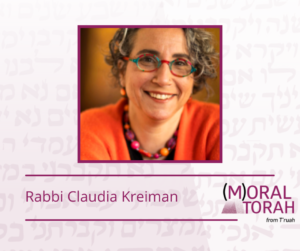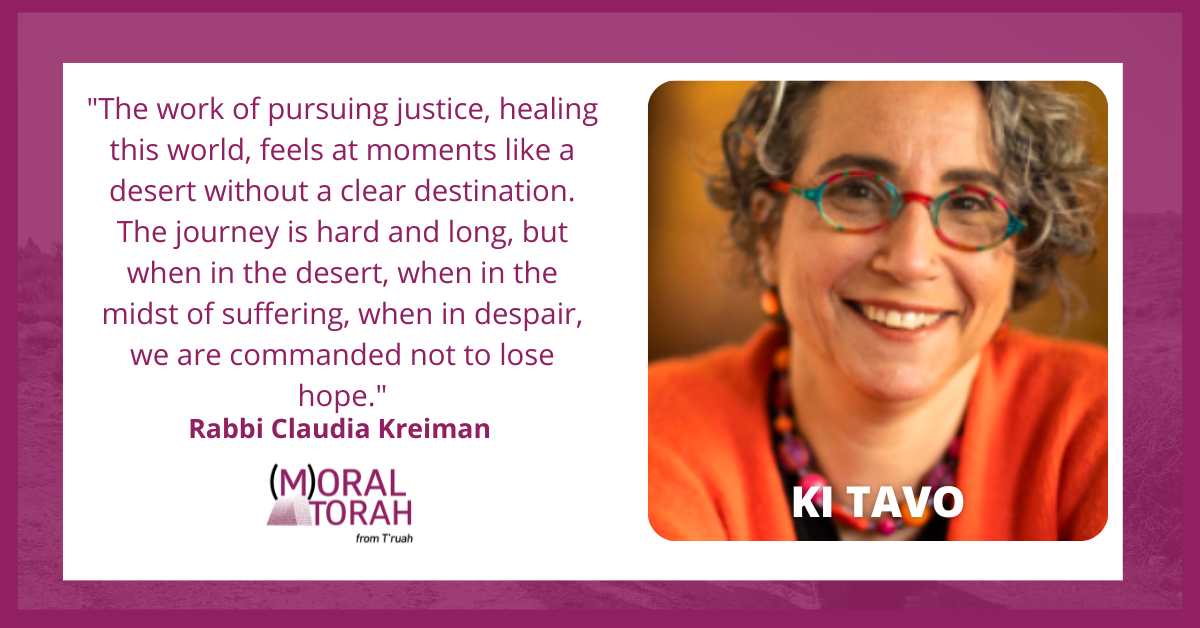A D’var Torah by Rabbi Claudia Kreiman for Parshat Ki Tavo
Several years ago, I visited a young Nicaraguan man who was being held in an ICE detention center while applying for asylum. Over the course of our visits, I learned that he had come to this country to escape horrible danger in his homeland. I offered spiritual support as well as practical support – connections that eventually helped him receive his asylum status.
On my first visit, which was the first time he was ever visited while in detention, he was moved to hear both that I was a clergyperson who spoke Spanish and that I wanted to talk about God and God’s presence in his life. Each time we met, he spoke of his gratitude for all the help he had received along his journey, including during his detention. He would say that God was helping him and that God was with him. His capacity to recognize the blessings in his life, along with his true trust that he was blessed while in jail, was humbling. In a moment of so much pain, suffering, and unknown, he held onto hope and gratitude.
This week’s Torah portion, Ki Tavo, begins with the mitzvah of bikkurim, or first-fruits. The Torah commands that, upon entering the land, each Israelite should bring a basket of produce to the Temple and give it to a priest, who would set it by the altar. Then the pilgrim would recite a scripted summary of the history of Israel from the days of Jacob, through the slavery in Egypt, to the present day, giving thanks in Jerusalem. While we no longer make offerings of first-fruit, we still recite the same verses during the Passover seder. (“My father was a wandering Aramean…”)
Sign up to receive (M)oral Torah in your inbox each week.
This ritual was given to us while still in the desert and not yet in the land, while we were totally dependent on God for sustenance and protection from a myriad of daily dangers. One of the only rituals found in the Torah with such great detail, it is unique in its liminal liturgy: within a time after leaving but before arriving, where hope is possible, when blessing is coming, when the aspiration is true and God is at hand; it demands a level of faith and trust. The order of the ritual is key. We first experience gratitude by bringing the fruits that the land has gifted us, by recognizing the blessing of God. Then we retell our story, linking the individual to the destiny of the people of Israel, acknowledging that my life, my blessing, my good fortune, is part of something larger than myself. I am not a solitary actor alone in the world but part of a community; if I have blessing, it is because I am rooted in the lives of those that came before and those who are not yet born. And lastly, actualizing this realization of connection in sharing with others by rejoicing with the Levite (who has no share in the land) and the stranger (who not only has no share in the land, but is not yet fully part of the fabric of society). By doing this we show that we truly understand that the blessings of our lives are not for our own pleasure but are given for the purpose of expanding our very sense of self.
Moses gave the ritual’s instructions while still in the desert, on the cusp of arriving in the Land of Israel, in the thick of the despair and hardship of the journey. The people of Israel are told: You will arrive at a place, and there will be blessing, and at that moment you will recognize the hardship, but you will enjoy the blessings, and then share it with those most in need. They have to trust and believe.
Find more commentaries on Parshat Ki Tavo.
For those of us who center our religious practice and life on social justice work, I believe that the bikkurim ritual has a lot to teach and inspire us. It can be daunting and exhausting to stay focused and, like Moses, hold onto the belief that we will arrive in a place of blessing, that we will enjoy those first-fruits. The current and continued brokenness of our world, the injustices that surround us, the ongoing suffering of those most vulnerable can make us lose hope, make it hard to believe that the aspirational land of milk and honey is somewhere on the horizon. The Torah unequivocally tells us that we will enter the land; we will enjoy its fruits; and in that moment we will link the blessing to our past, our journey, and to our continued obligation. The Torah doesn’t give up, but with certainty and clarity gives us directions of what to do with the blessing of those first-fruits: Say thanks and remain committed.
Like the young man from Nicaragua who held God’s blessing and presence, we, too, are commanded to find connection and hope, not to lose sight of God’s blessings.  In what I imagine was one of the most horrifying times of his life, filled with uncertainty after a long journey, before he had fully arrived, he had faith in God’s blessings. The work of pursuing justice, healing this world, feels at moments like a desert without a clear destination. The journey is hard and long, but when in the desert, when in the midst of suffering, when in despair, we are commanded not to lose hope. We must know that we will enter the land, we will have fruit to bless and to be grateful for, and in that moment of abundance, we will share that blessing with others.
In what I imagine was one of the most horrifying times of his life, filled with uncertainty after a long journey, before he had fully arrived, he had faith in God’s blessings. The work of pursuing justice, healing this world, feels at moments like a desert without a clear destination. The journey is hard and long, but when in the desert, when in the midst of suffering, when in despair, we are commanded not to lose hope. We must know that we will enter the land, we will have fruit to bless and to be grateful for, and in that moment of abundance, we will share that blessing with others.
Rabbi Claudia Kreiman is the Senior Rabbi of TBZ (Temple Beth Zion in Brookline, Mass.) and a board member of T’ruah. She is the first Chilean woman ordained as a rabbi.

